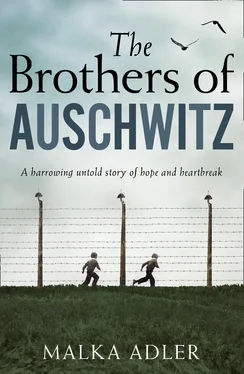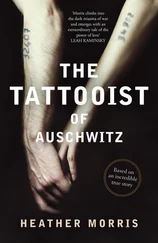I divided the clothes into piles. Men’s suits to the right. Dresses, skirts, and women’s blouses, to the left. Coats, apart on the right. Children’s clothing, behind me. Best of all was touching children’s clothing. They were stained and worn at the edges. Sometimes a patch or a tiny pocket, and another pocket stretched out of shape, sometimes embroidery with bright thread, a flower. Butterfly. Clown. Ah. The clothes had the smell of a regular home. The smell of soap and moth balls. Among the clothes I found some mama’s apron. A blue apron with a large pocket. I thrust trembling fingers into the pocket. I don’t know what I was looking for, but I found nothing. The apron smelled of fried pancakes and sausage. My mouth watered. I wanted to take the apron, hide it under my shirt. I didn’t dare because of the tall SSman who stood behind me, keeping an eye on my pace.
For hours, I ran among the piles, without stopping to rest. My legs ached but I didn’t even stop for a second. The SSman stuck to my back. Out of the corner of my eye I could see a hand and a gun. I knew he’d put a bullet in me where it prickled. In the hollow of my neck. Ever since I’ve felt a prickling in that hollow whenever autumn comes. Once I saw his face and there were nails there instead of pupils.
Daily routine at Auschwitz was consistent.
We got up early, in the dark. We straightened blankets, ran to the holes in the latrines to clean up, ten minutes to pee or shit, crowded together in a suffocating stink, then splash the face with a little water, the line for thin, tasteless coffee, parade – and then we were divided up for work. Groups upon groups of prisoners with dry faces, shaved heads, dirty and quiet.
We worked for twelve hours a day on a shrieking belly with pains in our muscles. Again the line for a bowl of soup. Again roll call in the bloc, and the evening parade, on the parade ground. Count. Mistakes. From the beginning. They hit a prisoner on the head with a baton. Thwack. Thwack. Scream into the loudspeakers for hours. I wanted to sleep. I so badly wanted to get to my bunk in the bloc, fall onto the board, sleep. I’d fall asleep in a second.
After three weeks they sent us on foot from Auschwitz to Birkenau, a distance of three or more kilometers. I dragged my feet in a convoy of uniform stripes. I could barely walk. I raised my head and saw a yellowish brown color, like the moment before a storm. Smoke coming out of a chimney. Dense, thick smoke without holes. Without spaces. There was a sweet smell outside. The smell of good meat cooked over a fire. I wanted to vomit. Thick saliva rose in me, disgusting. In the distance I saw a row of barracks with walls built of rough logs. I couldn’t see any windows.
Again I sorted through the piles of belongings emptied out of the suitcases. Shoes to shoes. Coats to coats. Bags to bags. Piles as high as a mountain inside the huge storerooms. I knew. The hands that had packed the suitcases were now pressed into a black smudge rising upward.
At Birkenau I lived in a barracks.
The barracks that finished off the most people. Between five and eight hundred people. The barracks had cubicles of three tiers. I slept on the third tier. Six prisoners to a cubicle. Every morning new prisoners would arrive and there was always space for them to sleep instead of the dead they’d dragged outside. Prisoners would take hold of the thin legs of the dead and pull them down from the cubicle to the floor. Sometimes I’d hear thump. Thump. Thump. The head would knock on the board, as if coming down steps. Thump. Thump. Thump-thump. Sometimes they stripped off their clothes there in the passageway, sometimes not. It depended on the smell of the dead from the night. Dead that smelled were left in their clothes.
Every morning I saw different faces beside me. Faces with hunger and certain death in them. Every morning I heard questions, as if I had answers. The cubicle stank like father’s cow shed. I hadn’t seen a shower in two months. The lice were in rows on my skin, as if SSman had given the order. I scratched until I drew blood. A lot of blood. I wanted to bite myself.
The head of the bloc, a giant with a triangular head, wore a striped vest. On his chest was a green triangle. The head of the bloc screamed, struck with a baton he always held in his hand like a long finger with a knob. The prisoners in the bloc whispered, they barely spoke. They reminisced about people they’d known back home. Reminisced about food. Asked one another how to erase spots that grew on the skin. Rashes, small sores, odd singes, signs of burns, scaly skin, infections here and there. They were alarmed by skin problems and by the doctor who’d examine naked prisoners and send them to Selektion . Between Selektion they’d argue about the chances of winning the war, or about a door that was left open to the cold. I didn’t interfere in anything. Whispers didn’t interest me. I’d put my head down on the wood and fall asleep.
One morning the loudspeaker played my number: Achtung, Achtung , A-4092 report outside. I was sure they’d throw me into the oven, that it was my turn for the Garden of Eden. I told myself, say goodbye to the world, Dov. Say goodbye to the sun. Say goodbye to the blue number on the arm. Say goodbye to the rags you’re wearing. Goodbye to the stinking cubicle. Goodbye to the lice smeared all over you, damn them. You and the lice into the fire together, but first the gas, because there is order.
I came out of the barracks like a boy with dignity.
I looked for the sun. I couldn’t find it and trembled as if they’d put ice in my trousers. Three more left the bloc with me. The large prisoner beside me didn’t stop crying. I walked upright, didn’t interfere. What could I say to him? I knew the Germans took strong guys for labor and it didn’t always help. What determined it was what they needed: If they did or didn’t need laborers for work. If things were held up at the crematorium or not. There were cases when whole transports were sent to the chimney, they didn’t even look at them on the platforms. And there were strong young men among them, each shoulder a shoulder, not just any hands, but hands that could carry a heavy calf without a problem. And there were cases they took so-so young men to the crematorium and then, right at the crematorium they told them to return to the barracks, why? The Sonderkommando hadn’t finished emptying out the previous transport . I was a boy and I knew I didn’t stand a chance.
On the side was an open truck of prisoners in striped pajamas. SSman, baton in hand, signaled us to climb into the truck on the double, to move in close. Beside him stood two guards with guns. We ran to the truck. Another SSman was waiting for us with a leg in the air. A strong kick in the backside and we were off. I didn’t know where they were taking us, and I didn’t ask. I thought, maybe to the forest to meet with a machine gun, a mass grave in a field, maybe to work? I didn’t dare ask the guards, didn’t want to talk with prisoners.
The truck stopped at a labor camp: Jaworzno.
Israel, 2001
14:18 boarding a suburban train on the Nahariya platform.
Because of the sea I stick to a window, wait for it to bring a few waves to Nahariya. Blue sea and cellphone ringtones. A cheerful Turkish march fails to wake the phone’s soldier. Stops. A message. On the left, Khachaturian’s Sabres attack and at the end of the carriage another tune and a message. Blah. Blah. Blah. A slight, pin-like pain digs sharply into my head, releases. Yitzhak would say, what do you want with a headache in a carriage, better you take a taxi. Dov would say, best to use headphones, you wouldn’t even hear the Auschwitz orchestra, would you?
I’d look at Dov, swallow saliva and remain silent. Finally I’d say, I just can’t wear headphones, can’t wear them, Dov, I have so much noise in my head, I need an opening. And then Yitzhak would ask, what noise do you have, huh? And I’d tell him, never mind.
Читать дальше












